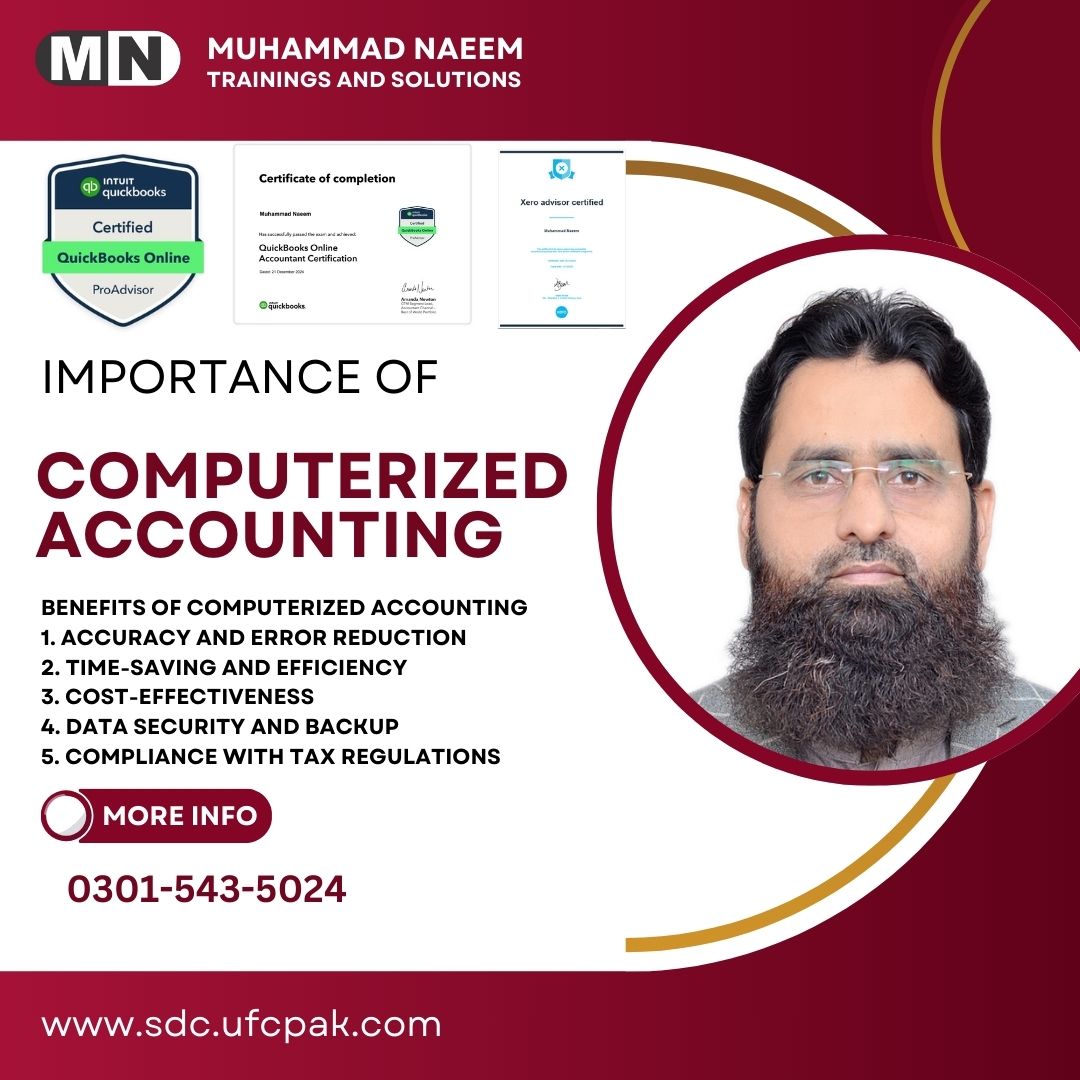THE IMPORTRANCE OF COMPUTERIZED ACCOUNTING IN BUSINESS

Introduction
In today’s fast-paced business environment, financial management is crucial for success. With businesses generating vast amounts of financial data, traditional accounting methods are no longer efficient. Computerized accounting systems have revolutionized how companies manage finances, ensuring accuracy, efficiency, and compliance.
What is Computerized Accounting?
Computerized accounting refers to using accounting software to record, store, and process financial transactions. Unlike manual bookkeeping, which involves paper-based records, computerized accounting systems utilize digital tools to automate financial processes, reducing errors and improving efficiency.
Benefits of Computerized Accounting
1. Accuracy and Error Reduction
- Automated calculations minimize human errors in financial statements.
- Built-in checks and alerts help in identifying discrepancies.
2. Time-Saving and Efficiency
- Transactions are recorded in real-time, eliminating the need for manual entries.
- Faster data retrieval and report generation facilitate better decision-making.
3. Cost-Effectiveness
- Reduces the need for extensive manual labor, cutting down administrative costs.
- Minimizes errors that could lead to financial losses or penalties.
4. Data Security and Backup
- Cloud-based accounting software ensures data is backed up and protected.
- Restricted access prevents unauthorized use of financial information.
5. Compliance with Tax Regulations
- Automated tax calculations help businesses comply with tax laws.
- Digital records simplify audits and tax filing procedures.
Importance of QuickBooks Online for Businesses
One of the most widely used computerized accounting solutions is QuickBooks Online, which provides businesses with a cloud-based accounting system to manage financial transactions efficiently.
1. Accessibility and Convenience
- QuickBooks Online allows businesses to access financial data from anywhere, making it ideal for remote work and multi-location companies.
2. Automation and Integration
- Automates invoicing, payroll, and expense tracking, reducing manual effort and enhancing efficiency.
- Seamlessly integrates with banking systems and third-party applications for streamlined financial management.
3. Scalability for Growing Businesses
- Whether a small business or a growing enterprise, QuickBooks Online provides scalable solutions to meet evolving financial needs.
Real-World Examples of Computerized Accounting
1. Small Businesses and Startups
- A small e-commerce store using QuickBooks Online to manage inventory, sales, and expenses efficiently.
2. Corporate Accounting
- Large enterprises using SAP Accounting Software for handling payroll, tax compliance, and multi-location transactions.
3. Freelancers and Consultants
- Independent professionals using Wave Accounting or Xero to track income, expenses, and invoices seamlessly.
Commonly Used Computerized Accounting Software
- QuickBooks Online – Ideal for small and medium businesses.
- SAP ERP – Used by multinational corporations for financial management.
- Tally ERP – Popular among businesses for inventory and tax management.
- FreshBooks – Designed for freelancers and small service-based businesses.
Challenges of Computerized Accounting
Despite its advantages, businesses must be aware of potential challenges:
- Cybersecurity Risks – Risk of hacking or data breaches.
- Software Costs – Premium accounting software can be expensive.
- Training Requirements – Employees need training to use advanced accounting systems effectively.
Conclusion
Computerized accounting is essential for modern businesses, offering unparalleled efficiency, accuracy, and financial management capabilities. Whether you’re a small business owner, freelancer, or part of a large corporation, investing in an effective accounting system like QuickBooks Online can streamline operations and drive success. As technology advances, embracing digital accounting solutions will become a necessity rather than an option.

